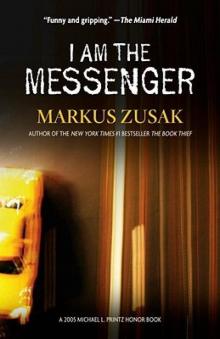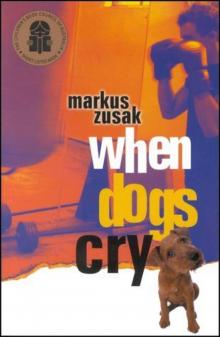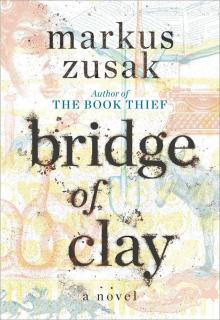- Home
- Markus Zusak
Bridge of Clay Page 16
Bridge of Clay Read online
Page 16
“Is it Matthew?” He’d handed it across more than spoken it. “You say his name a lot, in your sleep,” and he hesitated. “You say all of them, to tell you the truth, and others. Ones I’ve never heard of.”
Carey, Clay thought, but Michael said Matador.
He said, “Matador in the fifth?”
But that was enough.
Don’t push your luck.
When Clay gave him the look, the Murderer understood. He came back to the original question. “Did Matthew say you couldn’t go back?”
“No, not exactly.”
There was no need for anything else:
Michael Dunbar knew the alternative.
“You must miss them.”
And Clay raged at him, within.
He thought of boys, backyards, and clothesline pegs.
He looked into him and said, “Don’t you?”
* * *
—
Early, very early in the morning, close to three o’clock, Clay noticed the shadow of the Murderer, standing next to his bed. He wondered if it recalled in him, as it did in himself, the last time he’d stood just like that, on the terrible night when he’d left us.
At first he’d thought it was an intruder, but soon he was able to see. He knew those hangman’s hands anywhere. He heard the fallen voice:
“Pont du Gard?”
Quiet, so quiet.
So he’d seen him after all.
“Is that your favorite?”
Clay swallowed, he nodded in the darkness. “Yes.”
“Any others?”
“The Regensburg. The Pilgrim’s Bridge.”
“That’s three arches.”
“Yes.”
More thoughts, back to back. “Do you like the Coathanger then?”
The Coathanger.
The great bridge of the city.
The great bridge of home:
A different kind of arch, a metal one, who rose above the road.
“I love her.”
“It’s female?”
“She is to me.”
“Why?”
Clay tightened his eyes, then opened them.
Penny, he thought.
Penelope.
“She just is.”
Why did it need explaining?
* * *
—
Slowly, the Murderer backed away, into the rest of the house, and told him, “See you soon.” But then he added, in a moment of hope and recklessness, “Do you know the legend of Pont du Gard?”
“I need to sleep.”
Of course he Goddamn knew.
* * *
—
In the morning, though, in the empty house, Clay stopped in the kitchen when he saw it—on paper, in thick black charcoal.
He let a finger fall, and he touched them:
Final Bridge Plan: First Sketch
He thought of Carey and thought of arches, and again his voice surprised him:
“The bridge will be made of you.”
Five long years he lay in that garage, on the floor, till it happened.
Something made him get up:
The piano.
A muddled address.
The light of afternoon.
Here came a woman with music and two epics on her side, and what else could Michael Dunbar do?
As far as second chances go, he couldn’t have been luckier.
* * *
—
But okay, what happened in those five years in between?
He signed the lawyer forms, hands trembling.
He stopped painting altogether.
He was tempted to return to Featherton, but also remembered the voice in the dark, and the head down on his neck:
Maybe you’d still be there.
And then the humiliation.
Returning without the girl.
“Where is she?” people would ask.
“What happened?”
No, he could never go back for good. Word would get around, but that didn’t mean he wanted to hear it. It was bad enough listening to the thoughts that lay within.
“What?”
It would come to him often, halfway through dinner, or brushing his teeth.
“She just left him?”
“Poor guy.”
“Well, we can’t say we didn’t see it coming….She was wild, and he was, well, he was never the quickest of cats, was he?”
No, it was better to stay in the city. Better to stay in the house, and catch the scent of her less each day. After all, there was always work. The city grew. There was always a beer or two, alone at home, or with Bob and Spiro and Phil—just men from work, with wives and kids, or nothing, like him.
* * *
—
It was only to visit his mother that he returned to Featherton every now and then. He was happy to see her involved with the usual array of small-town escapades. Cake stalls. Anzac Day parades. Lawn bowls with Dr. Weinrauch on Sundays. That was the life.
When he told her about Abbey, she didn’t say much.
Her hand rested on his.
She was most likely thinking of her own husband, who’d walked into the flames. No one knew why some went in and didn’t come out. Did they want to come out that little bit less than the others? If nothing else, Michael Dunbar was never of two minds about Abbey.
* * *
—
Next, the paintings, which he couldn’t look at anymore.
Her image would start him wondering.
Where she was.
Who she was with.
The temptation was to imagine her in motion, with another man. A better man. No niceties.
He wanted to be less superficial than that, to say that such things didn’t matter, but they did. They reached below, at something deeper, and they were places he didn’t want to be.
One night, about three years in, he pulled the paintings to one side of the garage, and covered them end to end, with bedsheets: a life behind a curtain. Even when the job was done, he still couldn’t quite resist; he took one last look inside, he ran a palm across the biggest, where she stood, shoes in hand, on the shoreline.
“Go on then,” she said, “take them.”
But there was nothing left to have.
He pulled the sheets back down.
* * *
—
As the remaining time climbed by, he was swallowed by the city.
He worked, he drove.
He mowed the lawn; a nice boy, a good tenant.
And how could he ever know?
How could he know that two years later again, an immigrant girl’s father would be dead on a European park bench? How could he know that she’d go out in a fit of love and despair, and buy a piano, and have it delivered not to her, but to him—and that she’d be standing in the middle of Pepper Street, with a trio of useless piano men?
In many ways he’d never left that garage floor, and so often I can’t help seeing it:
He crouches and gets to his feet.
The sound of faraway traffic—so much like the ocean—a long five years behind him, and I think it, again and again:
Do it, do it now.
Go to that woman and piano.
If you don’t go now there’ll be none of us—no brothers, no Penny, no father or sons—and all that there is is to have it, to make it, and to run with it as long as you can.
On that Monday, after Michael had left in the dark, and Clay saw the sketch in the kitchen, he’d made breakfast and walked to the lounge room. The Murderer’s notes, sheets, and workings were in seven separate stacks on the coffee table. Some were taller than others, but all had a title on top. On each stack was a rock, or stapler, or scissors, to kee
p them from flying off. Slowly, he read each title:
MATERIALS
COUNCIL
SCAFFOLD
THE OLD PLAN (TRESTLE)
THE NEW PLAN (ARCHES)
RIVER
and
CLAY
Clay sat down.
He let the couch devour him.
He spelt Carey’s name out in his toast crumbs, then reached for the pile called SCAFFOLD.
* * *
—
From there, he read all day.
He didn’t eat or go to the bathroom.
He just read and watched and learned everything about the bridge in Michael Dunbar’s mind, and it was a great mess of charcoal and thick-set pencil. Especially THE OLD PLAN. That stack was 113 pages (he counted them), full of wood costs, techniques, and pulley systems, and why the previous bridge might have failed.
THE NEW PLAN was six sheets altogether—composed the night before. The first page of that small stack of paper said only one thing, several times.
PONT DU GARD.
The pages that followed were littered with sketches and drawings, and a list of definitions:
Spandrels and voussoirs.
Springing and falsework.
Crown and keystone.
Old favorites like abutment and span.
In short, the spandrels were standard stone blocks; the voussoirs were contoured for the arching. The springing was the final pressure point, of arches-meeting-pier. His favorite was somehow the falsework, though—the mold the arches were built on; a curvature of wooden construction. It would hold, then be taken from under it: the first test of each arch and survival.
* * *
—
Then CLAY.
He kept his eye on that CLAY stack, many times, as he read through everything else. The thought of picking it up excited him, but also held him just short. On top, its paperweight was a rusty old key, and below, a single sheet.
When Clay finally read it, it was evening.
He removed the key and held it slackly in his palm, and when he turned the title page, this was written beneath:
Clay—
See page 49 of THE OLD PLAN.
Good luck.
Michael Dunbar
Page forty-nine.
That was where it explained the importance of digging a trench across the forty-meter width of the river—to be working, all times, on the bedrock. As first-time bridge builders, it stated, they should go beyond where experts would, to be sure they weren’t taking chances. There was even a sketch: forty by twenty meters.
He read that passage many times, then paused until he thought it:
Forty by twenty.
And God knows how deep.
I should have looked at that pile first.
He’d lost a whole day of digging.
* * *
—
After a brief search, the key opened a shed behind the house, and when Clay went in, he found the shovel, lying benignly on the workbench. He handled it and looked around. A pick was also close by, and a wheelbarrow.
He walked back out, and in the last light of evening-afternoon, he made it to the riverbed. There was now a perimeter marked with bright orange spray. He hadn’t noticed from being inside all day.
Forty by twenty.
He thought it as he walked the borders.
Clay crouched, he stood, he watched the rising moon—but soon the toil invited him. He half grinned and thought of Henry, and how he knew he’d count him down.
He was out there all alone, as the past behind him converged—then three more seconds, and, now.
The shovel and splice of the earth.
In the tide of Dunbar past, they intersected, Michael and Penelope, and of course it started with the piano. I should also say it’s always been a kind of mystery to me, this starting-out time, and the lure of lasting happiness. I guess it’s like all our parents’ time together—their lives before they had us.
On that sunny afternoon, here in the city, they pushed the instrument down Pepper Street, and watched each other in glimpses, and the piano movers bickered:
“Oi!”
“What?”
“You’re not here for your looks, you know.”
“What’s that s’posed to mean?”
“It means push! Move it this way, idiot. Over here.”
One to the other, secretively: “The pay’s nowhere near enough for putting up with him, is it?”
“I know, no way.”
“Come on then! The girl’s putting more into it than you two combined.” Now to Penelope, from the upright girth of the piano. “Hey, do you need a job by any chance?”
She smiled, mildly. “Oh, no thanks, I have already a few.”
“It shows. Unlike these two useless— Oi! This way!”
And there, right there, she looked over, and the man from number thirty-seven gave her the crease of a collegial smile, then tucked it back inside him.
* * *
—
At the apartment, though, with the piano in place by the window, Michael Dunbar didn’t stay. She asked what she might give him as a gift for helping, whether wine or maybe beer, or wódka (had she really said that?), but he wouldn’t hear a word of it. He said goodbye and left, but when she played she saw him listening; her first experimental notes. The piano still in need of retuning.
He was out by the line-up of garbage bins.
When she stood to look closer he was gone.
* * *
—
In the weeks that followed, there was definitely a sense of something.
They’d never seen each other till the day of the piano, but now it was happening everywhere. If he was in line at Woolworths with toilet paper under his arm, she was at the next checkout with a bag of oranges and a packet of Iced VoVos. After work, when she walked onto Pepper Street, he would step from his car, further up.
In Penelope’s case (and this embarrassed her) she would often wander around the block a few times, purely for the handful of seconds it took to walk by the front of his house. Would he be on the porch? Would the light be on in the kitchen? Would he come out and ask her inside for coffee or tea, or anything at all? There was a synergy to it, of course, given Michael and Moon, and the walks through long-ago Featherton. Even when she sat at the piano, she often checked; he might be by the bins again.
* * *
—
As for Michael, he resisted.
He didn’t want to be back there anymore, where all was good but ruinable. In his kitchen he thought of Penelope, and the piano, and his haunted halls of Abbey. He saw this new woman’s arms, and the love in her hands, helping the instrument down the road…but he could make himself not go to her.
* * *
—
Eventually, months later, in April, Penny put jeans and a shirt on.
She walked up Pepper Street.
It was dark.
She told herself she was ridiculous, that she was a woman, not a girl. She’d traveled thousands of miles to get here. She’d stood ankle-deep on a wine-dark toilet floor, so this was nothing, nothing in comparison. Surely she could breach the gate and knock on a man’s front door.
Surely.
She did.
* * *
—
“Hallo?” she said. “But I think…I hope you remember me?”
He was quiet and so was the light; the space behind him in the hallway. And there again, that smile. At once surfaced, then lost. “Of course I do…the piano.”
“Yes.” She was getting flustered and it wasn’t English forming in her mouth; each sentence was exactly that—its own small punishment. She’d had to plant her own language in the middle and work her way around it. Somehow
she managed to ask if he might like to come and visit her. She could play the piano, that is, if he liked the piano, and she had coffee and raisin toast and—
“Iced VoVos?”
“Yes…” Why so embarrassed? “Yes. Yes, I have some.” He’d remembered. He’d remembered.
He’d remembered, and now, despite all self-warning and discipline, the smile he’d held fell out. It was almost like those army movies—the comedy ones—where the hopeless, hapless recruit struggles over a wall and flops to the other side; stupid and clumsy but grateful.
And Michael Dunbar succumbed:
“I’d love to come and hear you play—I only heard a few notes that first day, when they delivered it.” Then, a moment, a long one. “Here. Why don’t you come in?”
* * *
—
In his house there was a friendliness, but also something unnerving. Penelope couldn’t quite place it, but Michael certainly could. A life once had, now gone.
In the kitchen, they introduced themselves.
He motioned to a chair.
He caught sight of her catching sight of his rough, powdery hands, and just like that, it began. For quite a while, three hours at least, they sat at the table, which was scratched-up, wooden and warm. They drank tea with milk and biscuits, and spoke of Pepper Street and the city. Construction work and cleaning. It actually surprised him how easily it came to her once she’d stopped worrying about her English. After all, there was plenty to tell him:
A new country, and seeing the ocean.
The shock and awe of the southerly.
At one point he asked her more about where she’d come from, and how she got here, and Penelope felt at her face. She moved a blond patch of hair from her eye, and the tide pulled slowly away. She remembered the pale young girl who listened to those books that were read, and read again; she thought about Vienna, and its army of laid-out bunk beds. Mostly, though, she talked of the piano, and the cold barren world at the window. She talked about a man and mustache, and love without emotion.

 The Book Thief
The Book Thief I Am the Messenger
I Am the Messenger When Dogs Cry
When Dogs Cry Underdogs
Underdogs Underdogs: Three Novels
Underdogs: Three Novels Bridge of Clay
Bridge of Clay